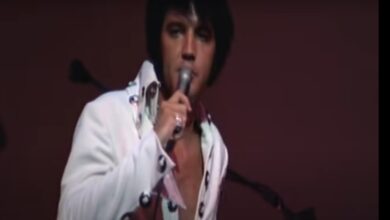Each time I listen, it never fails to take my breath away and make me miss him
The rehearsal of the Elvis Gospel Medley for the 1968 Comeback Special provides an intimate look into one of Elvis Presley’s most celebrated performances. This medley, which features three gospel songs—“Sometimes I Feel Like a Motherless Child,” “Where Could I Go But to the Lord,” and “Up Above My Head”—offers a rare glimpse into the depth of Elvis’s emotional and vocal prowess.
As the rehearsal begins with “Sometimes I Feel Like a Motherless Child,” Elvis’s voice immediately sets a profound tone. His delivery is raw and emotionally charged, reflecting the poignant nature of the song’s lyrics. This traditional spiritual, rooted in African American folk music, is characterized by its somber and reflective mood, which Elvis embraces fully. His strong, resonant voice carries the weight of the lyrics, making the performance both moving and impactful.
Transitioning into “Where Could I Go But to the Lord,” Elvis demonstrates his ability to convey deep spiritual emotion through his performance. This song is a heartfelt plea for refuge and support, and Elvis’s interpretation is infused with genuine sincerity and passion. His voice soars above the backing singers and instrumental accompaniment, highlighting his skill in blending emotional depth with powerful vocal delivery. The arrangement and Elvis’s performance bring a sense of reverence and comfort to the song, reinforcing its message of seeking solace in faith.
The final song in the medley, “Up Above My Head,” shifts the tone to a more upbeat and joyous expression of faith. This gospel number is lively and spirited, and Elvis’s performance is infused with a playful energy that contrasts with the more somber tones of the previous songs. The catchy chorus, “Up above my head, I hear music in the air,” showcases Elvis’s ability to engage with the audience through dynamic vocal delivery and infectious enthusiasm. His playful interaction with the band and backing singers adds to the uplifting atmosphere of the performance.
The rehearsal footage allows fans to witness the creative process behind one of Elvis’s most iconic performances. It captures the meticulous attention to detail Elvis and his team put into the medley, from the arrangement of the songs to the nuances of the vocal performance. The raw and unfiltered nature of the rehearsal reveals the dedication and passion Elvis brought to his music, particularly in his gospel performances, which held a special place in his heart.
Elvis Presley, born in 1935 in Tupelo, Mississippi, is widely regarded as one of the most influential figures in the history of music. Known as “The King of Rock and Roll,” Elvis’s career spanned several decades and included groundbreaking successes across various genres, including rock, pop, and gospel. His 1968 Comeback Special marked a significant return to live performance and allowed him to showcase his versatility and deep connection to gospel music, which was a significant part of his personal and musical identity.
The rehearsal of the Gospel Medley exemplifies not only Elvis’s vocal talent but also his deep spiritual connection and reverence for gospel music. This medley, along with the rest of the 1968 Comeback Special, solidified Elvis’s status as an artist capable of transcending genre boundaries and connecting with audiences on a profound level. For fans of Elvis and gospel music alike, this rehearsal is a compelling testament to his enduring legacy as an extraordinary performer and a cherished icon in the world of music.



